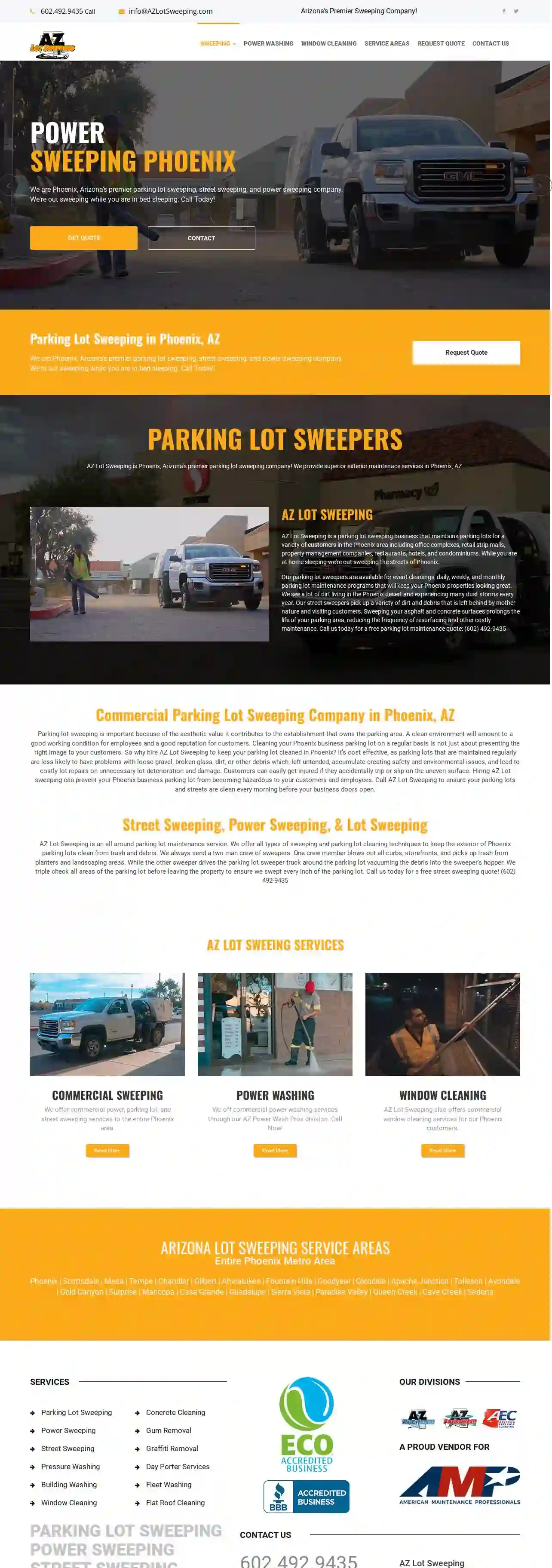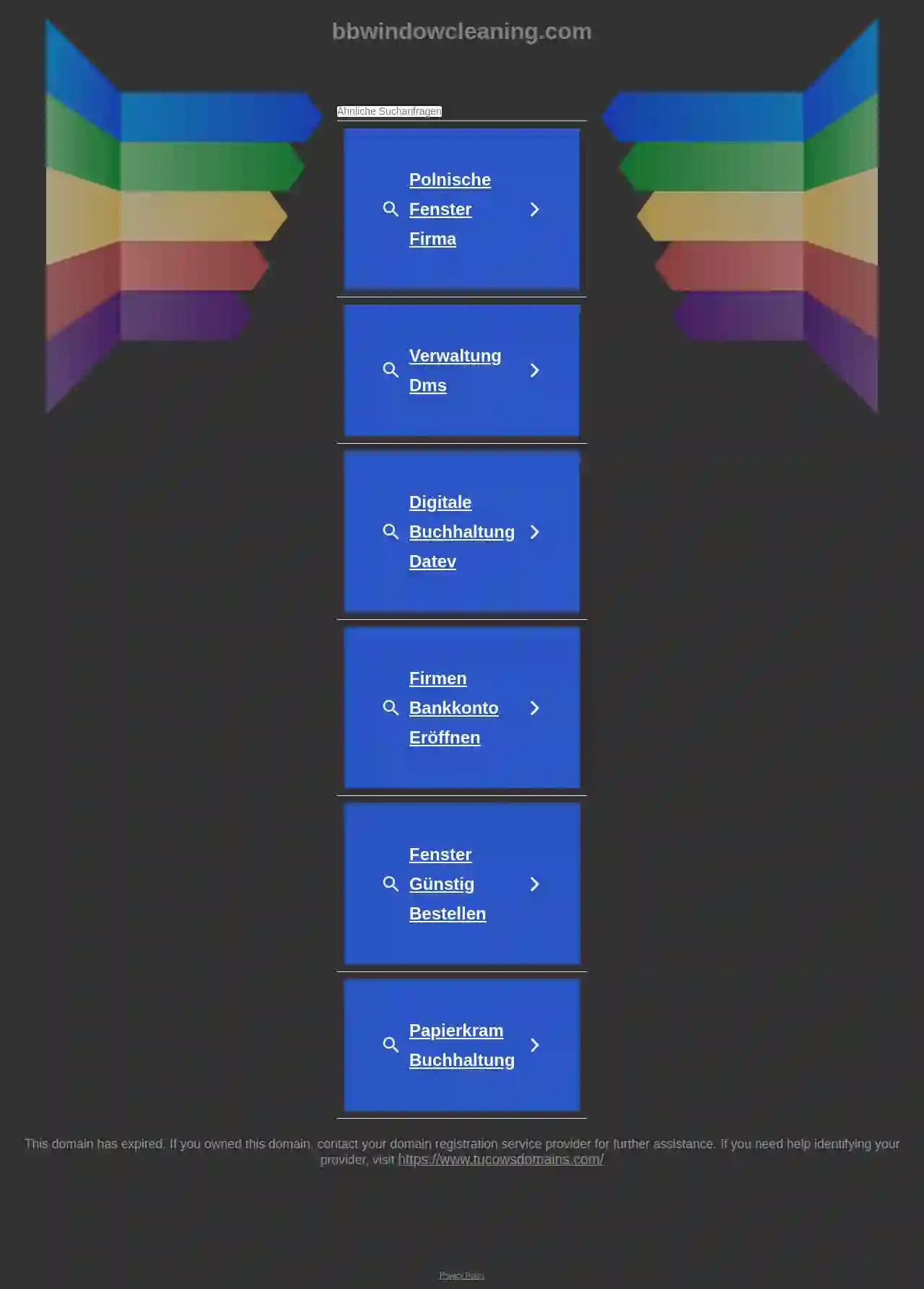Gutter Cleaning Sierra Vista
Top 10 Gutter Cleaning in Sierra Vista
Get up to 3 Roof Gutter Cleaning quotes for your project today! Compare profiles, reviews, accreditations, portfolio, etc... and choose the best service.

AZ Lot Sweeping
52 reviews1711 E Jackson St., Ste. D, Phoenix, 85034, USAZ Lot Sweeping is Phoenix, Arizona's premier parking lot sweeping, street sweeping, and power sweeping company. We provide superior exterior maintenance services in Phoenix, AZ. AZ Lot Sweeping is a parking lot sweeping business that maintains parking lots for a variety of customers in the Phoenix area including office complexes, retail strip malls, property management companies, restaurants, hotels, and condominiums. While you are at home sleeping we're out sweeping the streets of Phoenix. Our parking lot sweepers are available for event cleanings, daily, weekly, and monthly parking lot maintenance programs that will keep your Phoenix properties looking great. We see a lot of dirt living in the Phoenix desert and experiencing many dust storms every year. Our street sweepers pick up a variety of dirt and debris that is left behind by mother nature and visiting customers. Sweeping your asphalt and concrete surfaces prolongs the life of your parking area, reducing the frequency of resurfacing and other costly maintenance.
- Services
- Why Us?
- Accreditations
- Gallery
Get Quote
White Dove Windows
54 reviewsScottsdale, USWhite Dove Windows is a customer-favorite exterior cleaning company in the East Valley, Arizona. Founded with a mission to combat human trafficking, they donate a portion of their profits to organizations dedicated to this cause. They offer a wide ranges of services, including window cleaning, solar panel cleaning, pressure washing, house washing, roof cleaning, gutter cleaning, and Christmas lighting. Their team of experienced and qualified technicians is committed to providing prompt, efficient, and eco-friendly cleaning services. White Dove Windows prides itself on its transparent pricing, with no hidden fees, and guarantees 100% customer satisfaction.
- Services
- Why Us?
- Testimonials
- Gallery
Get Quote
Mansfield Services
4.9217 reviewsN/A, US- Services
- Why Us?
- Accreditations
- Our Team
- Testimonials
- Gallery
Get Quote
BNB Window Cleaning Scottsdale
4.943 reviewsScottsdale, USBB Window Cleaning is a professional window cleaning service serving the greater [City] area. We are committed to providing our clients with sparkling clean windows and a stress-free experience. Our team of experienced and reliable cleaners uses the latest equipment and techniques to ensure a thorough and efficient clean. We offer a variety of services to meet your needs, including residential and commercial window cleaning, gutter cleaning, and pressure washing. We are fully insured and bonded, so you can rest assured that your property is in good hands. Contact us today for a free estimate!
- Services
- Why Us?
- Accreditations
- Our Team
- Testimonials
- Gallery
Get Quote
Flush The Guts Gutter Cleaning and Guards
4.963 reviewsPeoria, USFlush The Guts Inc. is a fully insured local company that has been delivering customer satisfaction since 2012. 100% Satisfaction Guaranteed! We offer gutter cleaning, gutter guards, and siding washing for residential & commercial clients. Our team is easy to work with and will provide you with a step-by-step explanation of the work we do before we start. You can relax knowing that our highly skilled team will get the job done on time with no surprises! We provide exceptional gutter guard installation, gutter maintenance, seamless gutter installation & siding cleaning services to a wide range of commercial and residential properties. Our experienced professionals set the standard each day in gutter guard installation, gutter maintenance, seamless gutter installation & siding washing.
- Services
- Why Us?
- Gallery
Get Quote
Vermont Gutter Company
513 reviewsWoodstock, Vermont, USVermont Gutter Company is a leading provider of rain gutter installation, repair, and cleaning services in Vermont. With over 20 years of experience, our team of experts is dedicated to providing top-notch services to homeowners and businesses alike. We offer a wide range of gutter colors and styles to match your home's unique architecture and aesthetic. Our gutter installation crew is ready to help you with all your gutter needs, from installation to repair and maintenance. Contact us today to schedule a free estimate and experience the difference for yourself.
- Services
- Why Us?
- Our Team
- Gallery
Get Quote
iFixPhx
Glendale, USAt iFixPhx, LLC, we provide a wide range of handyman services to enhance your home. From holiday lighting installation to gutter cleaning, roof cleaning, and tree removal, our team handles it all with skill and efficiency. Our goal is to ensure your home looks and functions at its best, all year round. We stand out with our flexibility, one-on-one service, and customization options. Being fully licensed (ROC # 46279), we assure quality and reliability in all our services, including gutter cleaning, roof cleaning, pressure washing, and more. Our approach is built on being with our customers from start to finish, ensuring satisfaction in every task we undertake, whether it’s a small repair or a major installation.
- Services
- Why Us?
- Gallery
Get Quote
Kahuna Window Cleaning
53 reviews123 Main St, Phoenix, 85016, USKahuna Window Cleaning is a locally owned and operated window cleaning company serving the Phoenix area. We pride ourselves on providing top-notch service and unparalleled customer satisfaction. Our team of experienced professionals uses the latest equipment and eco-friendly products to ensure a sparkling clean finish every time. Whether you're a residential or commercial property owner, we've got you covered. Contact us today to schedule your appointment and experience the Kahuna difference!
- Services
- Why Us?
- Accreditations
- Our Team
- Testimonials
Get Quote
Four Seasons Gutter Protection Co
1815 Meadows Avenue, East Peoria, 61611, USAs a family owned and operated business since 2006, Four Seasons Gutter Protection Company is your exclusive local source for quality LeafX Clean Gutter Systems and the popular Sunsetter Retractable Awnings. We also offer a full-line of home improvement products and services including Replacement Windows, Vinyl Siding, Guttering & Downspouts, Decking & Railing, Roofing and Complete Remodeling Services. We work hard to make sure your home is protected from the weather which will save you money from long term repair costs caused by older faulty gutters or improperly installed new gutters. We are certified installers and do the job right the first time. Check us out for your next remodeling project including siding, windows, decking, awnings, guttering and leaf protection. We are dedicated to providing to quality products and services to homeowners throughout Central Illinois and offer quality products of all types designed to fit any budget. Call us today at 309-694-4565 or request a quote for more information!
- Services
- Why Us?
- Gallery
Get Quote
Spotless Window Squad
512 reviewsScottsdale, USSpotless Window Squad is a luxury home detailing company dedicated to providing top-notch window, mirror, and concrete cleaning services for both residential and commercial clients in the Phoenix area. We utilize state-of-the-art tools and ammonia-free cleaning products, ensuring exceptional results for every client. Our mission is to enhance the world view of our customers by rejuvenating the glass in their homes and businesses. We pride ourselves on our meticulous training process, ensuring each technician delivers 110% satisfaction every time. We are bonded and insured, providing peace of mind to our valued customers.
- Services
- Why Us?
- Our Team
- Testimonials
- Gallery
Get Quote
Over 60,241+ Janitorial Services in our network
Our janitorial pros operate in Sierra Vista & surrounding areas!
CleaningMatch has curated and vetted Top Janitorial Companies in and around Sierra Vista. Find a top & reliable pro today.
Frequently Asked Questions About Gutter Cleaning
- Re-Securing Gutters: Tightening or replacing loose fasteners to secure sagging or misaligned gutters.
- Sealing Leaks: Applying sealant or replacing damaged sections to fix leaks at seams or cracks.
- Replacing Damaged Sections: Replacing damaged sections of gutters or downspouts with new matching pieces.
- Downspout Repair: Reattaching separated downspouts, replacing damaged sections, or installing extensions to direct water further away from the foundation.
- Gutter Guard Installation: Installing gutter guards to prevent debris buildup and reduce maintenance.
- Prevent Ice Dams: Clogged gutters can contribute to the formation of ice dams in the winter, which can trap heat inside your attic, leading to higher energy bills.
- Protect Insulation: Overflowing gutters can cause water to seep into your attic, damaging insulation and reducing its effectiveness.
- Prevent Mold Growth: Clogged gutters can lead to moisture buildup, creating a favorable environment for mold growth, which can affect indoor air quality and require energy-intensive remediation.
- Safety: Installing gutter guards involves working at heights, which can be dangerous. Ensure you have a stable ladder and someone to spot you.
- Proper Fit: Gutter guards must be installed correctly to function properly. Improper installation can lead to leaks or reduced effectiveness.
- Gutter Compatibility: Not all gutter guards are compatible with all gutter types. Choose gutter guards specifically designed for your gutter system.
- Tools and Materials: You'll need tools like a ladder, measuring tape, screws or fasteners, and possibly a saw or snips to cut the gutter guards to size.
- Reduce Gutter Cleaning Frequency: Gutter guards significantly reduce the amount of debris that accumulates in your gutters, reducing the need for frequent cleaning.
- Prevent Clogs and Water Damage: By keeping gutters clear, gutter guards help prevent clogs that can lead to water damage.
- Reduce Pest Infestations: Gutter guards can deter pests like birds, squirrels, and insects from nesting in your gutters.
- Extend Gutter Lifespan: By preventing debris buildup, gutter guards protect your gutters from corrosion and damage, extending their lifespan.
What are some common gutter repairs?
A professional gutter repair company can assess your gutters and recommend the most appropriate repairs to restore their functionality and prevent water damage.
Can gutter cleaning improve my home's energy efficiency?
By preventing these issues, gutter cleaning indirectly supports energy efficiency in your home.
Can I install gutter guards myself?
If you're comfortable working at heights, have the necessary tools and experience, and are confident in your ability to install gutter guards correctly, DIY installation is an option. However, for professional results and a safer approach, hiring a professional gutter guard installer is recommended.
What are gutter guards, and do I need them?
Benefits of Gutter Guards:
While gutter guards are an effective way to minimize gutter maintenance, they don't eliminate it entirely. Regular inspection and occasional cleaning are still recommended. If you're tired of frequent gutter cleaning or concerned about water damage, gutter guards are a worthwhile investment.
What are some common gutter repairs?
- Re-Securing Gutters: Tightening or replacing loose fasteners to secure sagging or misaligned gutters.
- Sealing Leaks: Applying sealant or replacing damaged sections to fix leaks at seams or cracks.
- Replacing Damaged Sections: Replacing damaged sections of gutters or downspouts with new matching pieces.
- Downspout Repair: Reattaching separated downspouts, replacing damaged sections, or installing extensions to direct water further away from the foundation.
- Gutter Guard Installation: Installing gutter guards to prevent debris buildup and reduce maintenance.
A professional gutter repair company can assess your gutters and recommend the most appropriate repairs to restore their functionality and prevent water damage.
Can gutter cleaning improve my home's energy efficiency?
- Prevent Ice Dams: Clogged gutters can contribute to the formation of ice dams in the winter, which can trap heat inside your attic, leading to higher energy bills.
- Protect Insulation: Overflowing gutters can cause water to seep into your attic, damaging insulation and reducing its effectiveness.
- Prevent Mold Growth: Clogged gutters can lead to moisture buildup, creating a favorable environment for mold growth, which can affect indoor air quality and require energy-intensive remediation.
By preventing these issues, gutter cleaning indirectly supports energy efficiency in your home.
Can I install gutter guards myself?
- Safety: Installing gutter guards involves working at heights, which can be dangerous. Ensure you have a stable ladder and someone to spot you.
- Proper Fit: Gutter guards must be installed correctly to function properly. Improper installation can lead to leaks or reduced effectiveness.
- Gutter Compatibility: Not all gutter guards are compatible with all gutter types. Choose gutter guards specifically designed for your gutter system.
- Tools and Materials: You'll need tools like a ladder, measuring tape, screws or fasteners, and possibly a saw or snips to cut the gutter guards to size.
If you're comfortable working at heights, have the necessary tools and experience, and are confident in your ability to install gutter guards correctly, DIY installation is an option. However, for professional results and a safer approach, hiring a professional gutter guard installer is recommended.
What are gutter guards, and do I need them?
Benefits of Gutter Guards:
- Reduce Gutter Cleaning Frequency: Gutter guards significantly reduce the amount of debris that accumulates in your gutters, reducing the need for frequent cleaning.
- Prevent Clogs and Water Damage: By keeping gutters clear, gutter guards help prevent clogs that can lead to water damage.
- Reduce Pest Infestations: Gutter guards can deter pests like birds, squirrels, and insects from nesting in your gutters.
- Extend Gutter Lifespan: By preventing debris buildup, gutter guards protect your gutters from corrosion and damage, extending their lifespan.
While gutter guards are an effective way to minimize gutter maintenance, they don't eliminate it entirely. Regular inspection and occasional cleaning are still recommended. If you're tired of frequent gutter cleaning or concerned about water damage, gutter guards are a worthwhile investment.


